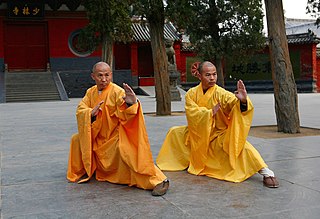
Zhàozhōu Cōngshěn (778–897) was a Chán (Zen) Buddhist master especially known for his "paradoxical statements and strange deeds".

Nanquan refers to a classification of Chinese martial arts that originated south of the Yangtze River of China around late Ming dynasty and early Qing dynasty.
Wushu was contested by both men and women at the 2006 Asian Games in Doha, Qatar from December 11 to December 14, 2006. It was competed in the disciplines of Taijiquan, Taijijian, Changquan, Daoshu, Jianshu, Gunshu, Qiangshu, Nanquan, Nangun, Nandao, and Sanshou. All events were held at Aspire Hall 3.
Wushu was both a men's and women's event at the 2009 Southeast Asian Games in Vientianne, Laos held from December 13 to December 17, 2009.

Brunei Darussalam participated in the 2010 Asian Games in Guangzhou, China on 12–27 November 2010.

Afghanistan participated at the 2010 16th Asian Games in Guangzhou, China.

Nanquan Puyuan was a Chán (Zen) Buddhist master in China during the Tang Dynasty. He was the student and Dharma successor of the Master Mazu Daoyi (709-788).
The men's nanquan three events combined competition at the 2002 Asian Games in Busan, South Korea was held from 10 to 13 October at the Dongseo University Minseok Sports Center.
The women's nanquan three events combined competition at the 2002 Asian Games in Busan, South Korea was held from 11 to 13 October at the Dongseo University Minseok Sports Center.
The men's Nanquan / Nangun all-round competition at the 2014 Asian Games in Incheon, South Korea was held on 22 September at the Ganghwa Dolmens Gymnasium.
Huang Junhua is a professional wushu taolu athlete from Macau. He is a two-time world champion and the second ever gold medallist for Macau at the Asian Games.
Phạm Quốc Khánh is a Vietnamese male wushu practitioner.
The men's nanquan / nangun all-around competition at the 2008 Beijing Wushu Tournament was held from August 21 to 22 at the Olympic Sports Center Gymnasium.
The women's nanquan / nangun all-around competition at the 2008 Beijing Wushu Tournament was held from August 21 to 22 at the Olympic Sports Center Gymnasium.
Lin Fan is a former wushu taolu athlete from China. She was a world champion in 2007 and 2011.
Ng Siu Ching is a former wushu taolu athlete from Hong Kong. She achieved an extensive medal record in international competition, becoming the first taolu athlete to win five gold medals at the World Wushu Championships. Ng also had multiple victories in the Asian Games and the East Asian Games.
Lee Yong-mun is a wushu taolu athlete from South Korea. He is a five-time medalist at the World Wushu Championships and was a world champion in 2013. He also won a bronze medal in men's nanquan at the 2018 Asian Games.
He Qiang is a retired professional wushu taolu athlete from China. At the 1990 Asian Games, he won the first gold medal for China in men's nanquan. Two years later, he became the world champion in nanquan at the 1993 World Wushu Championships. He then competed in the 1994 Asian Games and won once again in men's nanquan, becoming the second double gold-medalist at the Games alongside Yuan Wenqing.





